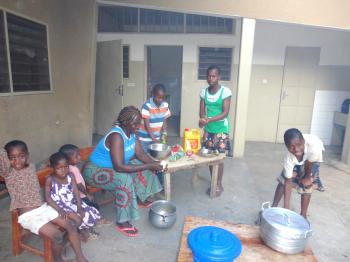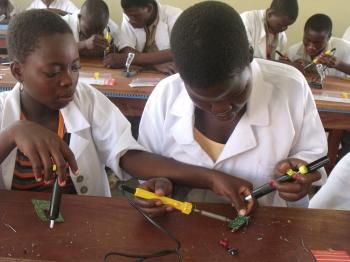Children lack access to education and basic services

An SOS family on their patio (photo: SOS archives)
The Kara region is one of the poorest in Togo; it is estimated that 75 per cent of the population lives in poverty. The infrastructure needs up-dating – about half of the population does not have clean water to drink. Poor families struggle to access health-care and send their children to school. The conditions are particularly bad for those living in the large slum settlements within the boundaries of the city of Kara.
The lack of health facilities is particularly worrying in a city which faces a high incidence rate of HIV/AIDS and of maternal and infant illnesses. The vaccination of children against disease remains a goal for the international organisations working in the area. For example, there are a number of children who, as a result of polio, live with disabilities; they are often discriminated against and abandoned by their families.
The complex social and economic situation causes families to struggle to stay together and children to end up without parental care. The absence of a steady source of income means that families cannot meet their needs and those of their children. Not only do children lack nutritious food, but they also fail to receive an education which will give them the chance to break the cycle of poverty as they grow older.
A pressing need to provide families with support and children with loving homes
SOS Children's Villages started working in Togo after a study concluded that the organisation's child-care model would meet the specific needs of children without parental care in Togo. Children were provided with loving homes in SOS families. Since then, our work has expanded and become a holistic package of services which meets the needs of the local population. For example, in light of the low education rate in the country, we also opened a kindergarten and schools where children can receive an education. The access to health-care remains uneven and the medical centre was opened in 1982.
What we do in Kara

Technical courses at the SOS school (photo: SOS archives)
We work closely with the families in the neighbourhood and aim to support these families so that they can stay together. The SOS Family Strengthening Programme acts in collaboration with local agencies to ensure that children have access to education and essential health and nutritional services. We also provide parents with counselling on parenting skills and income generating activities. We strengthen the support systems in the community so that families have someone to turn to when they need help. The SOS Social Centre runs a community self-help project which organises workshops and other activities.
Children who have lost parental care can find a loving home in one of the eleven SOS families, where up to 100 children can be looked after. The children grow up in a familial environment full of love, respect and security.
Young children can attend the SOS Kindergarten, which has capacity to care for up to 50 children, some of whom come from the neighbouring community. The provision of day-care is particularly valued by those parents who receive training or go to work. Older children go to the SOS Hermann Gmeiner Schools, where up to 420 pupils can receive a primary education and 260 attend secondary or technical education. Young people who are ready to leave their SOS families move into our youth programmes. With the support of qualified professionals they are guided through this new stage of their lives, as they start vocational training courses, attend higher education and start looking for work.
In addition, the SOS Medical Centre provides over 30,000 patients a year with treatment. It provides general in-patient care for children and mothers and a maternity ward. It also runs seminars on nutrition.